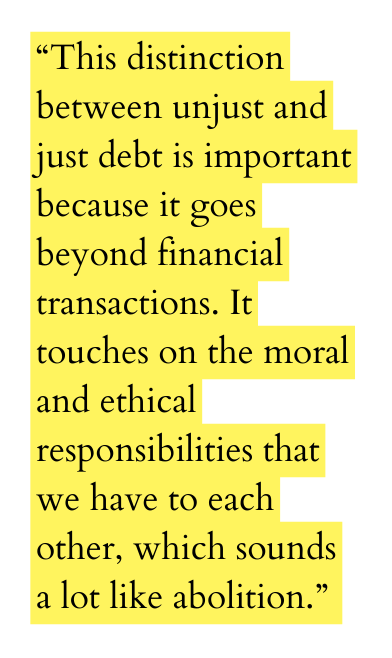Debt’s Reach: Unveiling Injustice and Collective Power with the Debt Collective
In an era where financial struggles are often framed as personal failings, conversations about debt are critical lenses into systemic injustices and collective resilience. Frederick Bell, Maddy Clifford, and René Christian Moya, prominent voices from the Debt Collective, bring these discussions to the forefront. Through their work, they illuminate how debt intersects with social inequality, housing insecurity, and healthcare access, urging us to rethink our understanding of financial burdens as shared societal challenges rather than individual woes.



Frederick Bell, co-founder of the Black Praxis Project (a curriculum-based political education platform created to discuss black radical texts and apply that knowledge to present-day movements), organizes campaigns aimed at canceling much of student debt. Maddy Clifford, a creative media strategist based in Oakland, employs artistry to disrupt hierarchical norms, advocating for economic disobedience and liberation within communities marginalized by debt. René Christian Moya, an organizer deeply entrenched in tenant rights and housing justice, spearheads initiatives that empower renters facing eviction amidst a housing crisis not seen since the Great Depression.
The Debt Collective, known for its pioneering efforts in debtors’ unions, amplifies the voices of those burdened by debt, advocating for structural reforms that challenge the status quo. Frederick, Maddy, and René’s narratives, shared below as edited transcripts from a panel at Bioneers 2024, reveal that debt is not merely a personal issue but a systemic tool of oppression, perpetuating cycles of inequality across generations.

MADDY CLIFFORD: So why are we talking about debt? Working-class folks are taught to think about debt as a moral failure. If good money management equals economic success, then owing student debt or being unable to pay rent is seen as a personal failure. This logic normalizes cruelty. We’re taught to see the person on the street as someone who wasn’t savvy enough to navigate the economic system. The reality is, we’re all closer to being unhoused than to being millionaires. We’re told to avoid financial landmines without asking why we’re walking on a minefield in the first place.
Debt is one of the ways neoliberal capitalism appears in our lives. Financialization—profit without producing. Our past due balances are rich people’s assets. Can’t afford an ambulance ride? Put it on a credit card. Don’t have a bank account due to former incarceration? Plenty of check-cashing companies are in your neighborhood. Need to go to college for a job with benefits? Here’s a student loan at 7% interest. Instead of taxing the rich, we pay them for public goods with interest. Unjust debt is extractive. Unjust debts worsen existing economic disparities and inadequacies.
The Debt Collective is about transforming society’s response to indebtedness by revealing the power borrowers and their allies have in solidarity. Our slogan is: “You Are Not A Loan.” The debts people carry in silence can be used collectively to demand access to public goods like housing, healthcare, and education.
So how does this work? What is a debtors union? We’re building complementary power alongside labor unions. Labor unions organize workers for higher wages and better working conditions at the site of production. Debtors unions organize at the site of social reproduction.

We’ve been demanding that the Biden administration cancel all federal student debt from day one. Our founders were part of the Occupy Wall Street movement, where student debt abolition was initially seen as a fringe issue. Debt Collective has shifted this issue into mainstream discourse.
Today, debt relief is the top economic issue for those who owe student debt, ahead of other policies. It makes sense because student loan payments are coming out of people’s pockets—they need to pay for groceries, rent, and child care.
We know we can win full student debt cancellation and college for all. College was once affordable, even free, in the 1950s, although mostly for white men. The roots of the student debt crisis run parallel to the integration of colleges, the Black Power movement, protests against the Vietnam War, and the Free Speech movement.
Ronald Reagan, as governor of California, campaigned on the idea that taxpayers shouldn’t subsidize intellectual curiosity. His administration cut funding for public universities, causing tuition hikes. This divestment in public education placed more burden on individual students.
Democrats also contributed to the student debt crisis. The Higher Education Act of 1965 included a federal student loan insurance program to back private lenders. As education became a commodity, colleges raised tuition and lenders increased interest rates. The rise of for-profit colleges in the 1980s and 1990s exacerbated the crisis, preying on single moms and people seeking better lives.

Today, 44 million Americans owe $1.7 trillion in student loans. To put that in perspective, if U.S. student debt were a country, it would have the 13th largest GDP in the world.
Debt worsens existing inequalities. Almost half of those burdened by student debt have debt but no degree. Forty percent of Latino student borrowers default on their loans compared to 29% of white borrowers. Women owe two-thirds of the $1.7 trillion in student debt. Black women carry more per capita, for longer, and with less help in paying back their debts. This has a catastrophic impact on the racial wealth gap. Canceling $50,000 in student loans per borrower would immediately increase Black wealth by 40%.
The federal government has the legal authority to cancel all student debt using the Higher Education Act of 1965, which allows the secretary of education to “compromise, settle, waive or release” all federal student loan debt. Despite the Supreme Court striking down Biden’s use of the Heroes Act of 2003 for student debt relief, the Higher Education Act still provides a path for cancellation.
At the Debt Collective, we’ve educated the public about this power. Biden has canceled $138 billion so far, fixing programs like Public Student Loan Forgiveness and income-driven repayment. However, we won’t stop fighting until all student debt is canceled and higher education isn’t a debt sentence.
Debt destroys dreams while cancellation activates them. To quote poet June Jordan: “We are the ones we’ve been waiting for.”
RENÉ CHRISTIAN MOYA: Starting with student debt was a great choice, as it’s what most people know the Debt Collective for. But we address more than just student debt, recognizing that debt plays a crucial role in the modern economy.
Let’s talk about where else debt is manifesting and how we’re addressing it.

I primarily work as a tenant organizer. I always clarify that I don’t organize around housing itself because houses don’t have needs or rights—people do. My focus is on tenants, especially those facing eviction. We’re currently in a severe housing crisis, the worst since the Great Depression. The majority of Americans are now rent-burdened, with two-thirds of low-income renters spending at least a third of their income on rent, and many paying half their income or more.
What’s notable about the current crisis is that middle-income individuals have seen the largest increase in rent burden over the past decade. Those earning between $30,000 and $75,000 annually have experienced the most significant rent increases. The affordable housing stock has drastically declined due to demolitions, conversions to owner-occupied units, or rent increases. For instance, California’s Costa-Hawkins Act of 1995 abolished vacancy control, allowing landlords to significantly raise rents when a unit becomes vacant, incentivizing evictions.
Nationally, we’ve lost about 6.1 million affordable units in the last decade. Although we’re seeing a boom in multi-family housing construction, the new units are often luxury apartments with rents exceeding $3,000 for a one-bedroom. This has led to a situation where 11% of renter households have rent debt, making them vulnerable to eviction. Moreover, corporate landlords and private equity firms are increasingly buying up housing stock, exacerbating the crisis.
The TL;DR is that rents have outpaced incomes for the last 10 to 20 years, evictions are soaring, and homelessness is growing rapidly. Evictions aren’t just a symptom of poverty; they’re also a cause, as highlighted by scholars like Matthew Desmond.

Globally, real estate constitutes the majority of the world’s assets, with residential real estate being the largest asset class at around $320 trillion. This creates a learned helplessness among politicians who hesitate to tackle housing issues because many benefit from the current system.
Our Tenant Power Toolkit has helped file about 8,000 eviction answers, protecting around 20,000 renters in California. It streamlines the eviction response process, providing tenants with the necessary paperwork and instructions. We’re also connecting tenants to tenant organizations and attorneys. In Los Angeles County, where only 3% of tenants have legal representation in eviction cases, we’re piloting a court support program to help tenants navigate the court system.
We’re about to launch a national rent debt survey to gather data on how rent debt is affecting people. Additionally, we’re starting to organize against large corporate landlords, recognizing that even tenants in expensive housing often struggle financially.
On the national level, we’re advocating for stronger tenant protections and rent control. We view housing as a climate issue, needing weatherized, electrified, and habitable housing to withstand the impacts of climate change.

Shifting to medical debt, over 100 million Americans struggle to pay healthcare bills, leading many to delay or forgo treatment. Nonprofit hospitals, which should provide low-cost care in exchange for tax breaks, often violate these rules, burdening patients with debt. Middle-aged adults, Black Americans, and women are disproportionately affected.
The Debt Collective is addressing this by targeting hospitals for debt relief and systemic changes. We’re conducting outreach in various states and working with partners like the L.A. County Health Department, which has declared a medical debt emergency.
To summarize, whether dealing with student, rent, or medical debt, we’re fighting for debtors against a system that disproportionately burdens the most vulnerable.
FREDERICK: I have $20,000 worth of student debt, and I just wanted to say that because we talk about naming it, and not being ashamed and identifying as a debtor. I’ve been out of undergrad, struggling to pay bills, struggling to find a job, just the same old, same old. And in the wealthiest country in the history of the world, you would think that we would have the resources to help me and other people like me not struggle.
I’m here to tell you that we do have those resources. It’s just about redistributing them. That means abolishing our prisons, liberating ourselves from meaningless and harmful work, redistributing our land, and decarbonizing our economy.
We also have to talk about unjust and just debts and stop thinking of the debts we owe creditors as legitimate. We need to focus on the real, legitimate debts that we owe each other as a society.

Dr. Martin Luther King, Jr., gave a famous talk in which he said, “Any law that uplifts human personality is just; any law that degrades human personality is unjust.” All segregation statutes are unjust because segregation distorts the soul and damages the personality. It gives the segregated a false sense of inferiority.
And that’s what I argue about unjust debts and what they do. They make you feel inferior; they make you feel like it’s an individual failing; and they trap individuals and nations in dependency cycles, serving only to deepen existing inequalities and exploit and profit off that exploitation.
Just debts, on the other hand, enhance the collective well-being of our society, and they serve to rectify the historical oppression and genocide of marginalized communities, specifically Indigenous folks and Black descendants of slavery.
This distinction between unjust and just debt is important because it goes beyond financial transactions. It touches on the moral and ethical responsibilities that we have to each other, which sounds a lot like abolition. Abolition talks about how we need to deconstruct these prisons and cages that we are putting people in bondage in, but it’s also about creating a world where we have access to healthcare, homes, and clean water.
I think that when we look at reparations as a legitimate form of just debt, we can’t look at it as a charitable gesture. It’s a moral obligation, and it’s a constructive project. Olúfémi O. Táíwò talks about how it’s deeper than “just give me a check.” It’s also about taking care of our environment, making sure that, as a society, we have empathy, and if our communities aren’t healthy, then we aren’t doing what we’re supposed to be doing.

